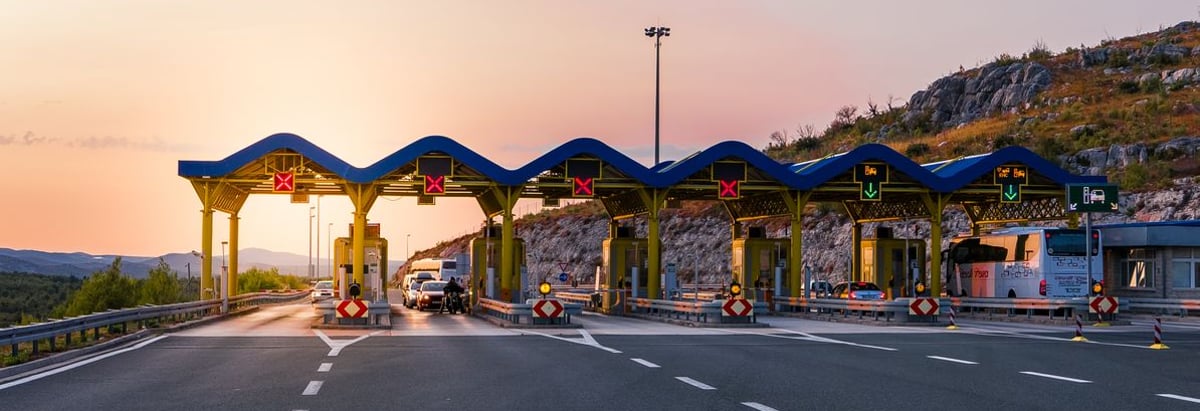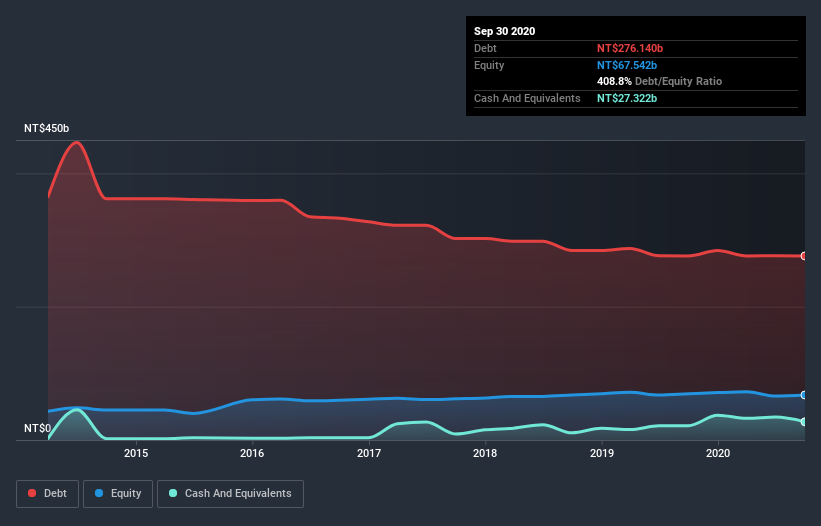
Some say volatility, rather than debt, is the best way to think about risk as an investor, but Warren Buffett famously said that 'Volatility is far from synonymous with risk.' So it might be obvious that you need to consider debt, when you think about how risky any given stock is, because too much debt can sink a company. As with many other companies Taiwan High Speed Rail Corporation (TPE:2633) makes use of debt. But should shareholders be worried about its use of debt?
Why Does Debt Bring Risk?
Debt is a tool to help businesses grow, but if a business is incapable of paying off its lenders, then it exists at their mercy. Part and parcel of capitalism is the process of 'creative destruction' where failed businesses are mercilessly liquidated by their bankers. However, a more frequent (but still costly) occurrence is where a company must issue shares at bargain-basement prices, permanently diluting shareholders, just to shore up its balance sheet. Of course, the upside of debt is that it often represents cheap capital, especially when it replaces dilution in a company with the ability to reinvest at high rates of return. When we think about a company's use of debt, we first look at cash and debt together.
View our latest analysis for Taiwan High Speed Rail
What Is Taiwan High Speed Rail's Debt?
The chart below, which you can click on for greater detail, shows that Taiwan High Speed Rail had NT$276.1b in debt in September 2020; about the same as the year before. However, it also had NT$27.3b in cash, and so its net debt is NT$248.8b.

How Strong Is Taiwan High Speed Rail's Balance Sheet?
The latest balance sheet data shows that Taiwan High Speed Rail had liabilities of NT$5.34b due within a year, and liabilities of NT$350.3b falling due after that. Offsetting this, it had NT$27.3b in cash and NT$1.62b in receivables that were due within 12 months. So its liabilities total NT$326.7b more than the combination of its cash and short-term receivables.
The deficiency here weighs heavily on the NT$162.7b company itself, as if a child were struggling under the weight of an enormous back-pack full of books, his sports gear, and a trumpet. So we definitely think shareholders need to watch this one closely. After all, Taiwan High Speed Rail would likely require a major re-capitalisation if it had to pay its creditors today.
In order to size up a company's debt relative to its earnings, we calculate its net debt divided by its earnings before interest, tax, depreciation, and amortization (EBITDA) and its earnings before interest and tax (EBIT) divided by its interest expense (its interest cover). Thus we consider debt relative to earnings both with and without depreciation and amortization expenses.
Taiwan High Speed Rail shareholders face the double whammy of a high net debt to EBITDA ratio (9.4), and fairly weak interest coverage, since EBIT is just 2.1 times the interest expense. The debt burden here is substantial. Even worse, Taiwan High Speed Rail saw its EBIT tank 38% over the last 12 months. If earnings keep going like that over the long term, it has a snowball's chance in hell of paying off that debt. When analysing debt levels, the balance sheet is the obvious place to start. But you can't view debt in total isolation; since Taiwan High Speed Rail will need earnings to service that debt. So if you're keen to discover more about its earnings, it might be worth checking out this graph of its long term earnings trend.
But our final consideration is also important, because a company cannot pay debt with paper profits; it needs cold hard cash. So the logical step is to look at the proportion of that EBIT that is matched by actual free cash flow. During the last three years, Taiwan High Speed Rail generated free cash flow amounting to a very robust 95% of its EBIT, more than we'd expect. That puts it in a very strong position to pay down debt.
Our View
To be frank both Taiwan High Speed Rail's EBIT growth rate and its track record of staying on top of its total liabilities make us rather uncomfortable with its debt levels. But on the bright side, its conversion of EBIT to free cash flow is a good sign, and makes us more optimistic. It's also worth noting that Taiwan High Speed Rail is in the Infrastructure industry, which is often considered to be quite defensive. Overall, it seems to us that Taiwan High Speed Rail's balance sheet is really quite a risk to the business. For this reason we're pretty cautious about the stock, and we think shareholders should keep a close eye on its liquidity. There's no doubt that we learn most about debt from the balance sheet. However, not all investment risk resides within the balance sheet - far from it. We've identified 2 warning signs with Taiwan High Speed Rail (at least 1 which shouldn't be ignored) , and understanding them should be part of your investment process.
If you're interested in investing in businesses that can grow profits without the burden of debt, then check out this free list of growing businesses that have net cash on the balance sheet.
If you decide to trade Taiwan High Speed Rail, use the lowest-cost* platform that is rated #1 Overall by Barron’s, Interactive Brokers. Trade stocks, options, futures, forex, bonds and funds on 135 markets, all from a single integrated account. Promoted
Valuation is complex, but we're here to simplify it.
Discover if Taiwan High Speed Rail might be undervalued or overvalued with our detailed analysis, featuring fair value estimates, potential risks, dividends, insider trades, and its financial condition.
Access Free AnalysisThis article by Simply Wall St is general in nature. It does not constitute a recommendation to buy or sell any stock, and does not take account of your objectives, or your financial situation. We aim to bring you long-term focused analysis driven by fundamental data. Note that our analysis may not factor in the latest price-sensitive company announcements or qualitative material. Simply Wall St has no position in any stocks mentioned.
*Interactive Brokers Rated Lowest Cost Broker by StockBrokers.com Annual Online Review 2020
Have feedback on this article? Concerned about the content? Get in touch with us directly. Alternatively, email editorial-team (at) simplywallst.com.
About TWSE:2633
Taiwan High Speed Rail
Taiwan High Speed Rail Corporation constructs, operates, and manages a high-speed railway system and related facilities in Taiwan.
Second-rate dividend payer with questionable track record.
Market Insights
Community Narratives



